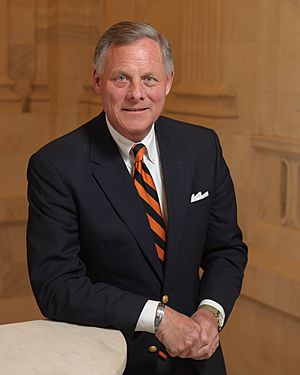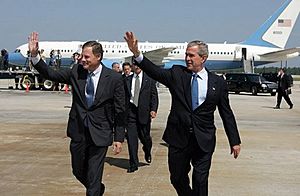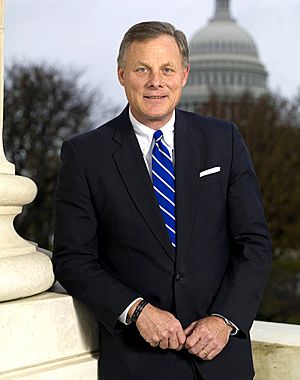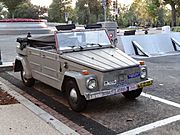Richard Burr facts for kids
Quick facts for kids
Richard Burr
|
|
|---|---|

Official portrait, 2015
|
|
| Chair of the Senate Intelligence Committee | |
| In office January 3, 2015 – May 15, 2020 |
|
| Preceded by | Dianne Feinstein |
| Succeeded by | Marco Rubio (acting) |
| United States Senator from North Carolina |
|
| In office January 3, 2005 – January 3, 2023 |
|
| Preceded by | John Edwards |
| Succeeded by | Ted Budd |
| Member of the U.S. House of Representatives from North Carolina's 5th district |
|
| In office January 3, 1995 – January 3, 2005 |
|
| Preceded by | Stephen L. Neal |
| Succeeded by | Virginia Foxx |
| Personal details | |
| Born |
Richard Mauze Burr
November 30, 1955 Charlottesville, Virginia, U.S. |
| Political party | Republican |
| Spouse |
Brooke Fauth
(m. 1984) |
| Children | 2 |
| Education | Wake Forest University (BA) |
| Signature | |
Richard Mauze Burr (born November 30, 1955) is an American politician and businessman. He served as a United States senator for the state of North Carolina from 2005 to 2023. As a member of the Republican Party, Burr represented the people of his state in Washington, D.C.
Before becoming a senator, Burr was a member of the United States House of Representatives. He was born in Charlottesville, Virginia, and later graduated from Wake Forest University. For many years, he worked as a sales manager for a company that sold lawn equipment.
From 2015 to 2020, Burr was the chairman of the Senate Intelligence Committee. This important committee oversees the nation's intelligence agencies. In 2016, he announced he would not run for reelection in 2022.
Burr was one of seven Republican senators who voted to convict former President Donald Trump during his second impeachment trial.
Contents
Early Life and Career
Richard Burr was born in Charlottesville, Virginia, on November 30, 1955. His family moved to Winston-Salem, North Carolina, when he was a child. He went to Richard J. Reynolds High School and graduated in 1974.
He then attended Wake Forest University, where he studied communications and played defensive back on the football team. After graduating in 1978, he worked for 17 years as a sales manager for a company that distributed lawn equipment.
Time in the U.S. House of Representatives
In 1994, Burr was elected to the United States House of Representatives. He represented North Carolina's 5th district. The House of Representatives is one of the two chambers of the U.S. Congress, along with the Senate.
While in the House, Burr worked on several important laws. He wrote the FDA Modernization Act of 1997, which updated rules for the Food and Drug Administration. He also helped create the National Institute for Biomedical Imaging and Bioengineering. After the 9/11 attacks, he worked to improve the country's defenses against bioterrorism.
Burr was reelected four times to the House. He was a popular representative in his district.
Serving in the United States Senate
In 2004, Burr ran for the U.S. Senate and won. He represented the entire state of North Carolina in the Senate. Senators serve six-year terms.
Senate Elections
Burr won three elections to become and remain a senator.
- 2004: Burr was first elected to the Senate, defeating Democrat Erskine Bowles.
- 2010: He was reelected, winning against Democrat Elaine Marshall. He was the first Republican from North Carolina to be reelected to the Senate since Jesse Helms.
- 2016: Burr won his third and final term, defeating Democrat Deborah K. Ross. During this time, he was also an advisor to Donald Trump's presidential campaign.
In 2016, Burr announced that he would not run for a fourth term. His final term ended on January 3, 2023.
Political Work and Views

During his time in the Senate, Burr was a leading Republican. He was the Chief Deputy Whip for his party, which is an important leadership role. He was known for being a conservative, and his votes often aligned with the Republican Party's positions.
Economy and Government Spending
Burr was a strong supporter of lower taxes. He signed a pledge promising not to vote for tax increases. He also believed there should be fewer government rules for businesses. He voted against the Dodd–Frank Wall Street Reform and Consumer Protection Act, a law that created more rules for banks after the 2008 financial crisis.
Environment
Burr believed that the climate is changing but questioned how much human activity was the cause. He often voted against government rules aimed at limiting pollution from businesses. He supported using different types of energy, including hydropower. In 2019, he helped start the Roosevelt Conservation Caucus, a group of Republicans who wanted to find new ways to solve environmental problems.
Gun Policy
Burr was a strong supporter of gun rights. The NRA, a group that supports gun ownership, gave him an "A+" rating. He voted against new rules that would have created an assault weapons ban or required more background checks for gun buyers.
In 2022, however, he was one of ten Republican senators who supported a new gun safety law. This law increased funding for school safety and added stronger background checks for buyers under 21.
Health and Education
Burr voted against the Affordable Care Act (ACA), a major health care law passed in 2010. He and other Republicans tried to pass laws to repeal and replace the ACA.
In education, Burr supported charter schools and voted for the No Child Left Behind Act of 2001. He generally voted against increasing federal funding for education projects, such as grants for college students.
Investigation of Stock Sales
In early 2020, Burr sold a large amount of stock just before the stock market fell due to the COVID-19 pandemic. As head of the Senate Intelligence Committee, he had received private briefings about the virus. This led to questions about whether he used non-public information for his sales, which is not allowed.
The Department of Justice investigated the stock sales. In January 2021, the department announced it had closed the investigation and would not file any charges against him.
Personal Life
Burr is married to Brooke Fauth Burr, and they have two sons. He is known for driving a classic 1973 Volkswagen Thing, which became a familiar sight around Capitol Hill. He is also a distant relative of Aaron Burr, who was the third vice president of the United States.
After leaving the Senate, Burr began working as a policy advisor for a law firm.
Images for kids
-
U.S. Senators Bob Corker, Richard Burr, Lamar Alexander, Kay Hagan, and Congressman John Duncan at the Great Smoky Mountains National Park in 2009.
See also
 In Spanish: Richard Burr para niños
In Spanish: Richard Burr para niños
 | Kyle Baker |
 | Joseph Yoakum |
 | Laura Wheeler Waring |
 | Henry Ossawa Tanner |





